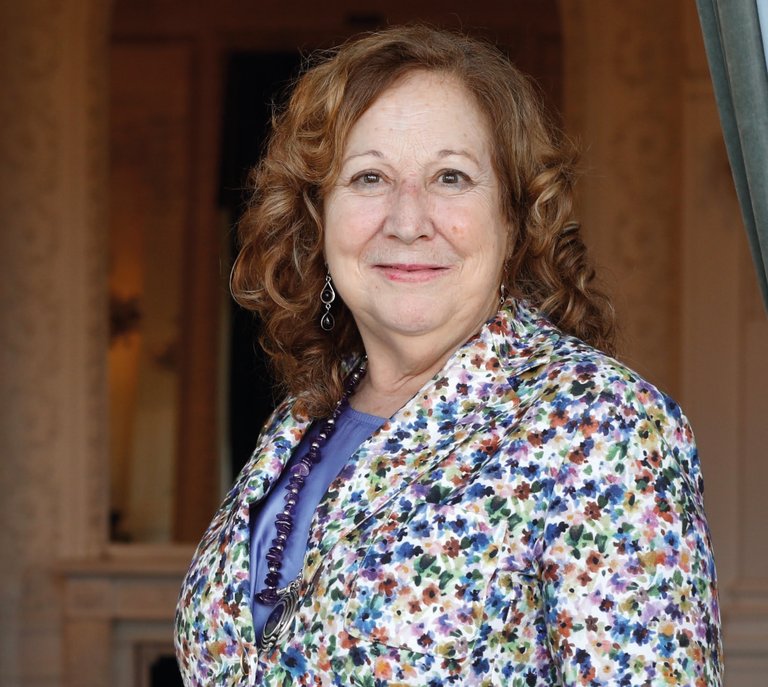“It is essential to break the dichotomy, to hybridize, and to change the paradigm.”
“Equality, science and technology. María Ángeles Sallé Alonso has received the magazine Elhuyar at the international conference “Towards a change of paradigm”, also welcoming. The conference was held in San Sebastián, on 23 and 24 October, by Emakundo, whose opening speech was given by Sallé. A PhD in Social Sciences and an expert in socio-economic development, equality and public policies in the digital society, in his lecture, based on data, he has made it clear that it is essential to break the dichotomy that rules today’s society, to hybridize, and to change the paradigm. The dialogue has provided an opportunity to deepen this.

For years, policies have been implemented to close the gender gap in the scientific-technological field. However, reality is stubborn and parity is still far away. What do you think is wrong?
To begin with, one should not underestimate the efforts that are being made, which are many and some successful. But first of all, there is a lack of deeper reflection on what policies we need. We lack the evidence. A lot of qualitative research has been done in the Anglo-Saxon environment, but much less in the Latin, Hispanic, and even Basque. We don’t have enough information to understand what’s going on.
On the other hand, in addition to recognizing and adding value to effective experiences, they must be put on the web to be aware of each other. You never have to start from scratch, ever. We have looked at the environments in which things are happening, to ask, to debate, to network, to build, from experiences.
So, first of all, we have trouble giving visibility and organizing to things that are doing well. Secondly, in general, we continue to think that it is necessary to attract girls in vocations, women in professional careers, especially in technological areas. And we don’t realize: if you attract him but don’t hold him, hold him and push him forward, what are we achieving? We need a systemic look.
We are focusing our efforts on creating vocations in girls, in the area of STEM. But, in my opinion, STEM is not the right concept, because there are girls in the sciences. They even dominate disciplines with a bio-prefix. On the contrary, when talking about hard science, it is not enough to say "come". Because we, stubborn, don't go there, do we? For what reason? Well, because it’s always the girls who are wrong; it’s always them who need to be corrected and guided; and always from a dichotomous point of view.
In fact, in your speech, you stressed the need to break the dichotomy.
Of course! Of course! You're a young girl, you're in high school, and you have to choose which branch to hit. You're very good at math, you like computers, but you also love dancing, everything that has to do with people... And they tell you that you have to choose, and to choose, what you like the least, or at least, what is not related to what you like the most. In my opinion, it is clear that the strategy of attraction must also be radically changed. The focus should be on the human side, the social impact...

It is also necessary to build a framework in which you will not have to choose. We have a huge hybridisation problem: we keep thinking about "technology here, humanities there". We won't get any tangible results if we don't change that.
By the way: in reading girls are much better than boys, but reading is not taken into account, it is not given value. On the other hand, I think it is very important because it shows, first of all, what their strength is and then allows us to create more narrative approaches, for example, to include a focus on objectives. This way, you don’t have to choose between the one that seems to have a great future and your strength.
All this in terms of attraction. And then what?
Not later, at the same time. At the same time, you need to give them the tools to be able to shape themselves in the world to come. You are in that tribal and hormonal world, and you are not given training on equality to know and decide what you will do when you have a partner, which is a crucial issue, especially in a heterosexual couple. There's a gap there.
At these ages, gender-sensitive training needs to be deeper and more practical. For girls and boys, for everyone. They must be given the tools to build and manage life projects: how to apply for a scholarship, how to negotiate a salary or a job, how to act if you want to be a mother... Girls need to understand that the obstacles they will encounter are not something personal, they are structural. This is essential at these ages.
And in addition to all this, it is necessary to create computer thinking skills in schools for girls and boys. After all, it is a language that requires literacy. Efforts are being made there, but they need to be accelerated.
And then yes, here comes your question: what happens when that girl arrives at the university? Those who have chosen Computer Engineering are expected to be there, without touching anything; let nothing be noticed.
Do not confuse the margins?
That's what it is! But there are some universities—for example, Carnegie Mellon and Harvey Mudd—that decided they wanted to be inclusive and made changes: they created mentoring programs, started running campaigns that linked careers and social impact, created networks among girls, changed didactics... Therefore, much can be done to make the environment more pleasant for girls, more stimulating and useful.
If nothing is done for this, the girls will continue to give up these studies, and those who choose them will also leave them more easily. You can’t set an example for these superwomen who, despite everything being against them, become a scientific-technological success. In fact, they are the exception, and most of us are not.
And what about the others who don’t choose technological careers?
Most of the women there. In medicine, for example, it was 71% last year [Spanish data]. If you look at the evolution, it is even more significant: a few years ago, they were less than 50%, and this increase has not only occurred because more women have entered, but because the boys have resigned. In fact, this phenomenon occurs: feminized careers become even more feminized, accompanied by precarization and underestimation; and masculinized careers become even more masculinized.
Therefore, we must proclaim the sciences that women do: social sciences, biosciences... Keep in mind: the terminology itself is very eloquent. All the sciences related to people are soft sciences, while the others are hard sciences. There is a clear underestimation there, although the soft ones are the ones who care about life!
But politics doesn't care about the women who are there.They always focus on those spaces where girls are a minority, in order to increase their presence, and nothing is done in the spaces where they are present.
But today, psychologists, journalists, doctors, geneticists, anthropologists, sociologists... everyone needs technology. Therefore, it is necessary to inject technology into these careers and Vocational Training. In what way? Based on their narratives and preferences. Everything is there to be done; and it is the key, because that is where the young women of the present are. This requires a global vision and a paradigm shift.
The next step is the work world. There will also be a task...
It’s similar there: we’re not doing much for women who have moved to non-STEM areas. And the efforts to digitize, the plans to consolidate production, improve efficiency, innovation and competitiveness... are not all focused on the areas where women are present. In fact, there is a distinction between economic and social activities: economic activities are hard, while social activities are soft. The latter have no technology.
It is another example of dichotomy. This is evident in the subsidies given to small and medium-sized enterprises: almost everything is directed towards hard-core, male-led activities. And activities dominated by women only receive a small percentage. They are invisible.
More attention is given to women who have gone to the hard areas, to those who are a minority. And what do you see? The discrimination continues. It is especially serious for those who choose to have children. In fact, the professional career is linked to a certain schedule, as if by chance.
At New York University, a study was conducted to find out how the researchers were 12 years after the start of their research career. The women replied that they had had to give up motherhood or had fewer children than they had intended. It was, and is, systematic, because there is a total incompatibility. It seems impossible to change schedules and ways of doing things. It is true that great progress has been made; for example, permits are now longer and inalienable. But the culture has not changed; there are still guilt, punishments of one kind or another...
Does this culture have a big impact?
Get the facts out: I still have to hear that "they have been given the same opportunities and yet they have abandoned it." The same possibilities? Hey, hey, hey, hey! You’re there, facing all the structural hurdles; and if your partner is a man, you support his career—and he doesn’t have the hurdles you have!—and all the extra work you do is not valued. In fact, there are a lot of extra jobs in the centres (welcoming newcomers, helping scholarship holders, enjoying the environment...) that women do as they should, but they are not recognized or paid for, even though without them the institutions would be demolished. And if you leave, you're the one who's giving up the opportunity. For what reason? Well, because the focus is always on women.
It is not always possible to focus on women and, even less, only on our shortcomings, because this will never work. The messages are also very disappointing: we only talk about cracks, syndromes and ceilings. And other things are silenced, such as sexual harassment.
I’ve done a lot of research in Latin America, and I’ve found a lot of evidence of persecution, but there’s no talking about it. There's a law of silence about it. Therefore, it is essential to change these environments so that women also have the opportunity to pursue careers in them and do not leave.
And we also need to be aware of it, and empower it, and empower it. After all, we are the products of our society, but we are also agents of change; both together. Therefore, we are contradictory and we must make the unconscious aware. In other words: in order to do things better, we need to know the situation with data and evidence. In fact, most people, other than some ladies, are reasonable. But, as long as we have the structure internalized, we consider as normal several things that happen every day. However, if it is exposed, people are able to understand it.
We are talking about changing the paradigm, and it is impossible to do something like this without a deep reflection. And not just academic, but a reflection that connects academia and activism. I’m not interested in knowledge, I don’t know who is going to climb the altars. Knowledge must be used for transformation, which requires that scientific knowledge permeate and traverse issues of practical reality.
Knowledge must flow in both directions: from the academic field to the labor and activist, and vice versa. There's a dichotomy there too. Flow and hybridization are essential, but today the world is increasingly polarized.
What are the consequences of this dichotomy and polarization?
Well, the consequences are very, very serious. The talent of women, this knowledge that they have gradually built about the subject, is out of place where the future is being built. And it’s not just a matter of gender equality; this can lead to an existential risk. Among them, there are many things: that talent is lost, that women suffer... But the biggest and most dangerous loss is another: that we are building a new world without women.
Look at how the world is: wars here and there; tech giants measuring who’s bigger and competing against who’s in space before... Where are the women? We're not on the map of power unless it's in the role of a victim or a savior. And this is a great loss personally and for society.
Whether or not we hybridize this immense technological knowledge that we have, whether or not we focus it on people’s needs, we will have a great opportunity or an existential risk. That's what's at stake. Therefore, we must change the paradigm from thinking that technology is to overcome the limits of nature, to thinking that it must serve to preserve it. And the care includes taking care of the planet and understanding that, in addition to the logic of progress, there is also the logic of containment, which is precisely the most important thing today. We need a culture of care.
Buletina
Bidali zure helbide elektronikoa eta jaso asteroko buletina zure sarrera-ontzian









